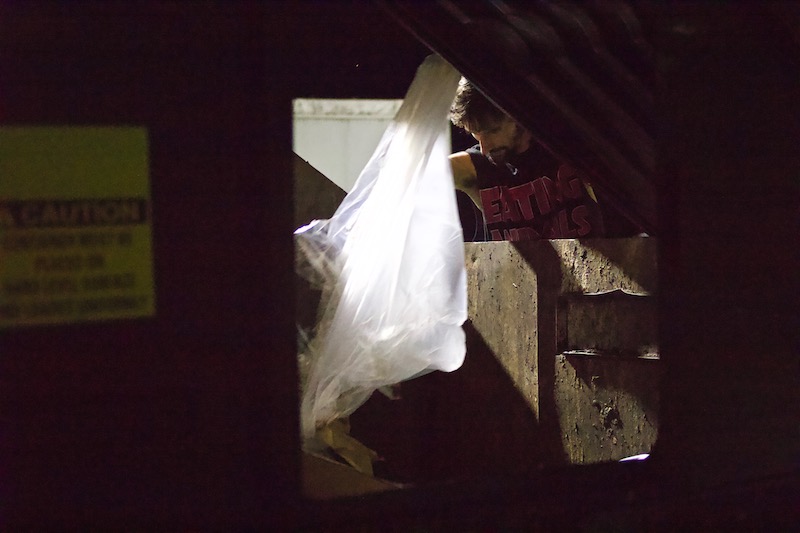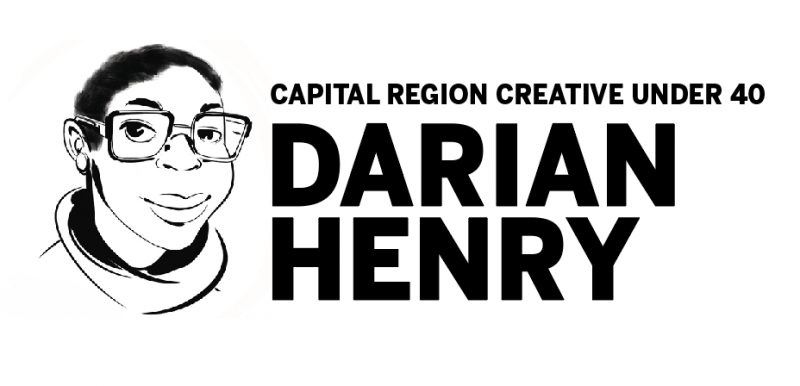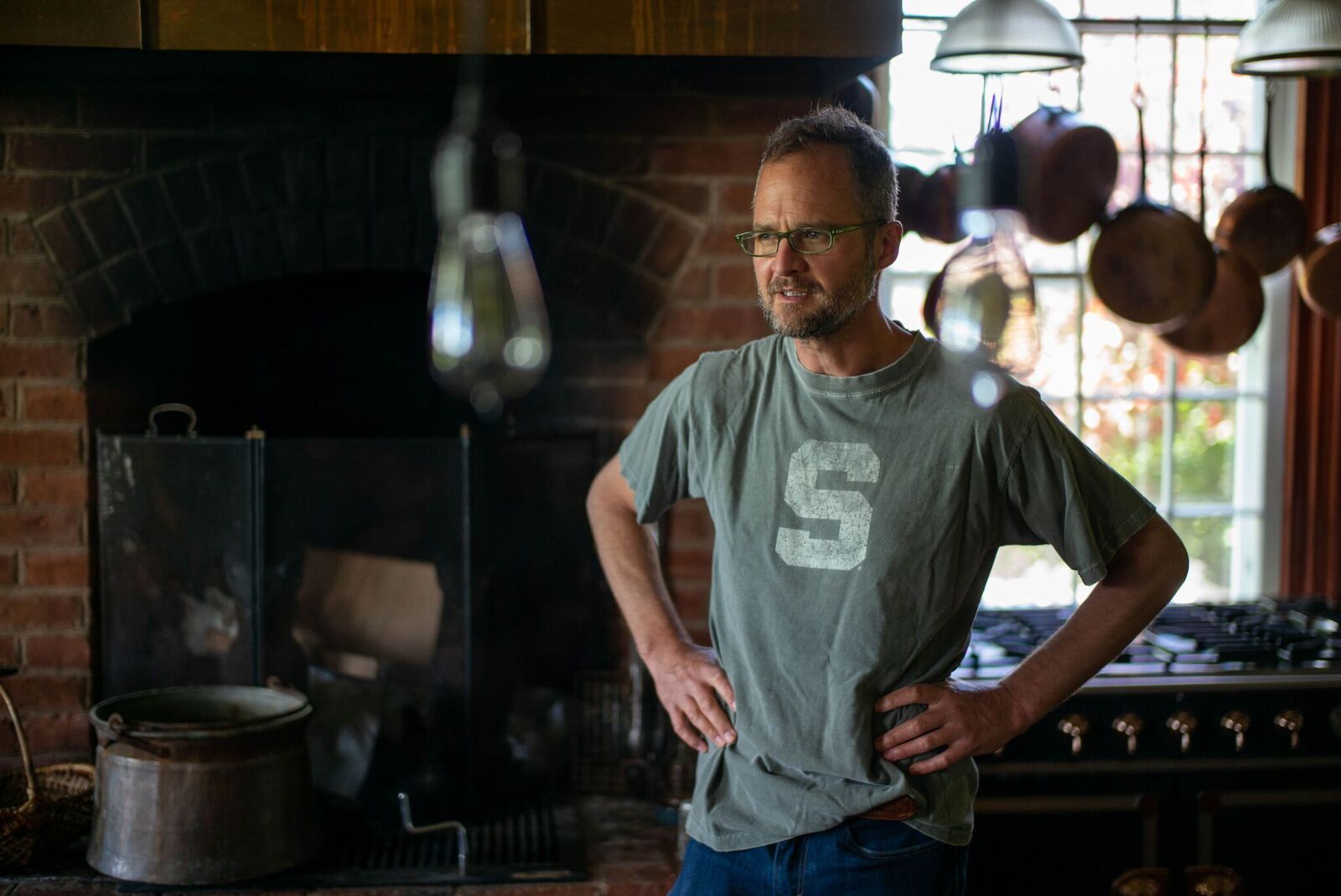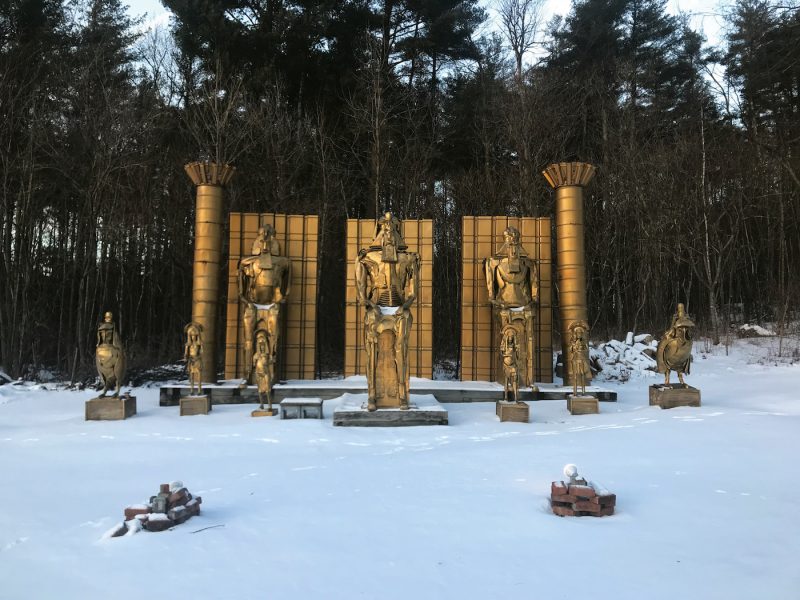This article first appeared in The Alt on August 9, 2018.
Photos by Shannon Straney
It’s 10:30 PM on a Tuesday. Garrett McCluskey is waist deep in the dumpster, grinning as he tosses out packaged breads to Dave Gunn and Alyssa Gallagher while Alicia Yadis looks over a pile of vegetables and canned goods. Michelle Montepagani leans over, picking around the edges of the container McCluskey may have missed. In just 15 minutes, the group has pulled out a bulk box of original and jalapeño flavored corn chips, several bags of vidalia onions, a half dozen heads of lettuce, and a sack of potatoes. They’ve filled one entire garbage bag full of the stuff (loaves, hot dog and hamburger buns); another is full of packaged whole wheat tortillas.
The items look perfectly edible, even fresh.
“Breads can’t be sold five days out anywhere in New York state, so most likely it’s the date,” Yadis explains. Yadis is a grocery store manager (of which establishment, she omitted), so she knows the ins and outs.
At each site, she fields questions like:
“Why would they throw out an entire case of juice?” (One bottle may have broken and spilled on the other bottles in the case, so they’re “dirty.”)
“A sealed, undamaged bottle of salad dressing that hasn’t reached its expiration date?” (Likely returned by a customer. Food items can’t be put back on the shelves.)
“Yet another bag of fresh onions?” (One of them is bruised. Many grocery chains have a strict policy that 100 percent of the produce must be unblemished to stay on the shelves. If “higher ups” come in and notice blemished fruits and vegetables, the store is marked down.)
In many of the cases, she says, it’s because of the store’s rotation setup. When a new shipment of goods come in and need to go on the shelves, they often run out of room.

“It’s built into the system,” Gunn says. “They know they’re not going to sell everything, because that’s not the point…Ultimately capitalism isn’t about solutions. They need to keep people needing things.”
These six dumpster divers identify as anarchists. One of the main tenets, they say, is just sharing. Under this ideology, the group believes everyone should have equal, unrestricted access to the resources needed to survive. So they spend most of their time providing mutual aid by distributing what they find to their community.
Up to 40 percent of the food produced in the United States is never even eaten, the National Resources Defense Council reports. And according to a 2016 Feeding America study, an estimated 2.4 million New Yorkers are food insecure, meaning they lack access, quality, and quantity of food to maintain a healthy lifestyle. Roughly 38,000 of those live in Albany County alone, with 17,710 in Rensselaer County, 17,760 in Saratoga County, and 16,730 in Schenectady County.
The goal, Gunn explains, is to help their community become self sustaining. He and his friends are the brains behind the semi-monthly Really Really Free Market in Albany where anyone can come and take as many items as they need, free of charge. (No, really.)
“It’s magical. The last one was the best one we’ve ever had, with mini fridges and fans for the summertime, and there was a line there more than an hour early,” he says. “They started bickering and looking through the window at all the stuff and we were afraid that there was actually going to be our first fight and by the time we opened the doors…they were like, ‘No we decided together as a group who would get what.’ I think the spirit of the event rubs off on people. You leave feeling a lot better.”
“It’s different. Nobody feels patronized,” he adds. “It’s not charity, it’s solidarity.”
“We’re giving to each other and providing for each other as neighbors, as equals. Not from a pedestal,” Andrew “Toby” Warwick says. “At the Free Market, for example, people perceive it differently. We level as humans. We have these really intimate conversations with each other that I think you would be really hard pressed to find at like, a soup kitchen.”
It helps, he adds, that they’re all coming from a similar place. Three of the dumpster divers out this evening are squatting. One has been homeless on and off for years. Without an address, they describe not being able to apply for a bank account, food stamps, or a job. They’re passionate about distributing what they can, because they know it’s something they’ve needed at one point or another.
“To come from nothing, it shifts your perspective of the entire world. It’s like you’re no one and people have so many assumptions about you,” Montepagani says.
They host food giveaways whenever they can, on the front porches of where they are squatting. It gives them a chance to meet neighbors and share their finds, being open and honest that the food has come from dumpsters.
“If anything, there’s a moment of hesitation, but they look everything over and it’s fine,” Gallagher says. “Then the question is, ‘How much can I take?’”
“What gets them the most is that it’s free,” Gunn adds. “It feels so unnatural. What’s the catch?”
The excess piles of food the group finds this evening will be donated to the Food Not Bombs Albany chapter, local animal sanctuaries (the horses and donkeys love apples and sweet potatoes), and are left in public spaces for the homeless. They make sure to leave notes for passers-by, assuring them that the food is both free and vegan—a vitally important lifestyle shared by the group.

“Sometimes, as you can see, you get an excessive amount of one thing. As one person I could never use all that,” Gallagher explained, eyeing the mountain of tortilla packages they’ve begun to stack.
At the dumpster full of bread, the group has also gathered pounds of packaged and sealed meat items, only to show the full extent of food waste from just one local grocery store.
“We don’t see animal flesh, dairy or eggs—even if it’s free—as food,” Gunn explains. “We toss it back in. It would be a disservice to the people we give this stuff out to, to give them animal products.” (Regardless, having been sitting out for hours these items are unfit for consumption.)
A stomach turner for the group for ethical reasons alone, the packages of meat provide a little extra kick in the gut in this summer heat. Maggots.
“You can’t be squeamish when you’re doing it,” Gallagher shrugs.

Later that night, we visit one dumpster full of discarded meat products. It reeks. There are piles of corn dogs, bologna, ham, and bacon. One box full of frozen hot dogs was never even unpackaged to be put on the shelves. Montepagani has jumped right into the stench to salvage cases of cherry tomatoes. “Can’t be afraid to get dirty,” she grins in the darkness.
“The most heartbreaking part of all of this is seeing dead animals that were bred to be eaten and didn’t even get eaten,” McClusky says gravely. “Their lives were lived for garbage.”
They’ll spend anywhere from 30 minutes to a couple of hours at a dumpster, making sure they’re satisfied with what they can rescue. At another site, Gunn’s headlamp pans over a fairly empty container. Suddenly, his voice echoes out triumphantly, “Oh, hell yeah! Sweet Baby Ray’s!”
There’s not a ton of items in this dumpster, but what they find is pretty significant. A shaker of organic basil and dressings, snack bars and fresh fruit and vegetables. There are unopened juices, gallons of tea and a 24-case of water bottles. “This will never cease to amaze me,” he says, shaking his head as he heaves it out. “Isn’t it crazy?”
“When you see the bottom, that’s like, gold,” says Montepagani. She and McCluskey have unearthed a massive watermelon and cracked it open. It smells like summer and they’re feasting.

In the past few weeks, the group has found more watermelon than they know what do do with. Tonight, this site provides a crate full of fingerling potatoes, peppers, strawberries, lettuce, mushrooms, onions, asparagus, and bags of mixed greens.
“It makes it fun planning meals,” Gallagher says of their regular hauls. “It’s like Chopped. It makes us creative.”
“Whenever you think of something and want something, the dumpster gods provide it,” Montepagani adds, laughing. “I was sick once while we were dumpstering and the first thing I pulled out was cold medicine.”
At what Gallagher refers to as the “cookie dumpster” for its consistent provision of vegan cookies, they find a package of dog food, dozens of gummy fruit candy packs, whipped face cream, and a tube of dead sea mineral clay mask.
“What you’re seeing is also applicable to non-food dumpsters,” Gunn says. At a recent trip to an office supply store, the group hauled packs of pens, colored pencils, stickers, packages of paper and envelopes, a three-hole puncher, and their personal favorites, botched prints of posters and portraits that are always good for a laugh.
Throughout the evening, a few cars pass and survey the group curiously, but no one stops them from digging. One night shift worker by the dumpster full of hot dogs is always there when they visit, but doesn’t bother them. Dumpster diving isn’t illegal, though there can be trouble if a business decides you are trespassing.
Some have been approached more than others.
“I’ve been bothered a few times,” Montepagani says. Once a store employee grabbed her arm and took a box of food items from her before dumping its contents back into the dumpster and threatening to call the police. She left. “Some people think they own what’s in the garbage,” she shrugs.
While they fondly recall finding gold nuggets like limited edition Oreos (a vegan delicacy), cases of allergy medicine, a pallet of mushrooms, over 100 sweet potatoes, toilet paper, 30 bottles of Sriracha, 10-pound bags of rice, scented candles, and 600-thread cotton sheets, they’re aware these are lucky occurrences.

They describe coming across perfectly good articles of clothing, furniture, and home goods that have been slashed, ripped or spray painted orange, or once, a pile of calendars with the dates crossed out with marker. They’ve opened some dumpsters only to be hit by the smell of bleach that had been poured all over the food. It’s the reason the locations of the sites describe here are not identified. But there’s an unlimited amount of waste to salvage and share with those in need.
Many of their dives are diligently catalogued by Gunn on social media. His logs help share the massive amounts of unopened goods—food and otherwise—that are wasted on a regular basis. From the evening spent diving with the group alone, in the span of roughly two hours, Gunn documented the excursion on his Instagram account @imjustabagofbags:
“When we were still living at a stable apartment, we were doing it a couple times a week because it was so exciting. We lived right around the corner from Madison Theatre where there’s that Price Chopper. So many homeless people hang out there so it was the perfect spot. The food would be gone in a half hour,” he says. “You slowly strike up relationships with these people and that’s really nice. These are members of the community that are oftentimes invisible. Now we know them by name and they know us. We want it to empower people, too. You can do this. Leave a free box at your laundromat or your job. It really comes down to sharing, all the things that we do can be done by you tomorrow.”





